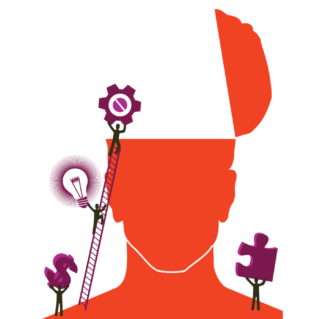I believe you’ve got to get up every day, keep moving and tackle what’s in front of you.
In some ways, I was lucky. I wasn’t born wealthy. I didn’t come up through any kind of Ivy League or high-powered business dynasty. I didn’t know anything about big-city life and was relatively unsophisticated in the ways of the world. But I did have very positive and supportive parents who were excellent role models. In baseball terms, let’s say, I was born on first base. It wasn’t like I had to hit the ball and run to get there. My parents, community and upbringing gave me that kind of solid head start. I’ll always be grateful for that.
You Can’t Change Your History
I’ve known people who grew up with wealthy, highly educated parents and all kinds of other advantages. You know the ones I mean: people who were born on third base and think they hit the triple themselves. And I’ve known people with a mountain of misfortune to overcome in life—bad background, abusive parents, no money, no advantages—people born swinging at the plate with two strikes already against them.
“I think what’s important is to know what’s important. The main thing in life is to know what the main things in life are.”
But all of that is completely beside the point. It’s all past; none of us is going to change any of it. You can’t change your history. Things that are outside of your control are outside your control. Do circumstances matter? It would be naive to say they don’t. Of course, where you’re born, where you grow up, who your parents are or aren’t, where you’re fortunate enough (or unfortunate enough) to go to school, all these circumstances, and many others, play a role. But they’re not what matters most. What matters most is what you do about it.

The Word of Business Tends to Reveal Your Character
You may not be able to map out everything you’re going to do in life. But you can decide what you believe in. You can find those things that you know are true, that you know you’ll follow no matter what. The world of business tends to reveal your character. Sometimes you’ll see smart and talented people burst on the scene like a shooting star, and then a few years later you’ll wonder why you’re not hearing about them anymore. You’ll notice everyone saying, “Hey, whatever happened to so-and-so?” I’ll tell you what happened to so-and-so. Their character caught up with them. I’ve seen this scenario replay itself over and over again, more times than I can count. You probably have, too.
Words are truly cheap. Anyone can talk a good line, and a good line may influence people for a time. But not for the long haul. Ultimately people don’t follow your words. They follow your integrity, your spirit. They don’t follow what you say. They follow what you do and who you are.
We are Human Becomings
No matter who your parents were, where you grew up, what happened to you or didn’t, the bottom line is that what kind of person you turn out to be is your decision. I don’t mean a decision you make in one big burst of clarity on your 18th birthday, in an explosion of light with angels singing. It’s a decision you make again and again, every day—in fact, dozens of times a day. We describe ourselves as human beings, but I think the truth is more like this: We are human becomings. Being the kind of person others look up to and are glad to be around, the kind of person others will follow, isn’t something that happens to you. It’s something you decide, something you work on. It’s not a gift. It’s an ongoing project. And it’s more than worth the effort.
“No matter who your parents were, where you grew up, what happened to you or didn’t, the bottom line is that what kind of person you turn out to be is your decision.”
When I graduated from Newton High School in 1975 a friend of my dad’s gave me a copy of Great Expectations. Inside on the flyleaf, he had written an inscription: “To Johnny Addison, for whom I have great expectations!”
What Kind of Behavior Do You Emulate?
Well, that made one of us. I sure appreciated the vote of confidence, but as for me, I didn’t know what kind of expectations I had. If you’d asked me at the time what were my big goals in life, I probably would have said, “Um…” and who knows what would have come out next. The only things I did know were who I admired and what kind of behavior I wanted to emulate.
When people know from an early age what they want to do with their lives, I think that’s awesome. But I don’t believe it’s the most crucial thing. I believe what’s more crucial than what you do is how you go about doing it. I think what’s important is to know what’s important. The main thing in life is to know what the main things in life are.
 John Addison, author of Real Leadership: 9 Simple Practices for Leading and Living with Purpose, Leadership Editor for SUCCESS magazine, and President and CEO of Addison Leadership Group, engages and inspires audiences with his relatable messages. Most recently, he served as Co-CEO of Primerica Inc., a company he joined more than 35 years ago.
John Addison, author of Real Leadership: 9 Simple Practices for Leading and Living with Purpose, Leadership Editor for SUCCESS magazine, and President and CEO of Addison Leadership Group, engages and inspires audiences with his relatable messages. Most recently, he served as Co-CEO of Primerica Inc., a company he joined more than 35 years ago.



